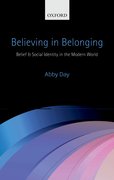 Almost twenty years ago, Grace Davie observed that despite plenty of studies into the ‘exotic edges’ of religion, ‘the picture in the middle remains remarkably blurred’. Seeking to address this imbalance and engage with the ‘beliefs of ordinary British people in everyday life’, Abby Day‘s recent book, Believing in Belonging (the first topic for this interview), builds upon her doctoral and later postdoctoral fieldwork, beginning within small communities in Yorkshire, and extending to a number of modern industrialised nations.
Almost twenty years ago, Grace Davie observed that despite plenty of studies into the ‘exotic edges’ of religion, ‘the picture in the middle remains remarkably blurred’. Seeking to address this imbalance and engage with the ‘beliefs of ordinary British people in everyday life’, Abby Day‘s recent book, Believing in Belonging (the first topic for this interview), builds upon her doctoral and later postdoctoral fieldwork, beginning within small communities in Yorkshire, and extending to a number of modern industrialised nations.
in this interview with Chris, recorded at the 2013 BSA Sociology of Religion Study Group Conference at Durham University, Day introduces listeners to the concept of ‘belief’ and sets out her own inductive approach, using semi-structured interviews, whereby definitions were allowed to arise from the field. Her central thesis acts as a focal point for a wide-ranging and insightful discussion on a variety of topics from nationalism and secularisation, to the usefulness of censuses as tools for measuring ‘religion’, to gender and belief in destiny. These themes are also picked up and developed in a recent volume published by Ashgate – Social Identities Between the Sacred and the Secular – which was co-edited by Abby, Chris, and Giselle Vincett.
Wearing one of her other hats, Abby also presents regularly on how to build an academic career, win research funding, and get articles published, and has published the books academic publishing and building an academic career.
Podcast: Play in new window | Download | Embed
Subscribe: RSS
You can also download this interview, and subscribe to receive our weekly podcast, on iTunes. If you enjoyed it, please take a moment to rate us. And remember, you can use our Amazon.co.uk or Amazon.com links to support us at no additional cost when buying your important books etc.







